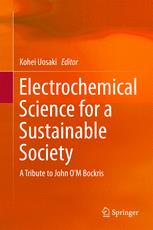

Most ebook files are in PDF format, so you can easily read them using various software such as Foxit Reader or directly on the Google Chrome browser.
Some ebook files are released by publishers in other formats such as .awz, .mobi, .epub, .fb2, etc. You may need to install specific software to read these formats on mobile/PC, such as Calibre.
Please read the tutorial at this link: https://ebookbell.com/faq
We offer FREE conversion to the popular formats you request; however, this may take some time. Therefore, right after payment, please email us, and we will try to provide the service as quickly as possible.
For some exceptional file formats or broken links (if any), please refrain from opening any disputes. Instead, email us first, and we will try to assist within a maximum of 6 hours.
EbookBell Team

4.7
106 reviewsThis book honors Professor. John O’M. Bockris, presenting authoritative reviews on some of the subjects to which he made significant contributions – i.e., electrocatalysis, fuel cells, electrochemical theory, electrochemistry of single crystals, in situ techniques, rechargeable batteries, passivity, and solar-fuels – and revealing the roles of electrochemical science and technology in achieving a sustainable society.
Electrochemistry has long been an object of study and is now growing in importance, not only because of its fundamental scientific interest but also because of the central role it is expected to play in a future sustainable society. Professor John O’M. Bockris contributed greatly to various aspects of fundamental and applied electrochemistry – such as the structure of the double layer, kinetics and mechanism of the electrochemistry of hydrogen and oxygen, electrocatalysis, adsorption and electrochemical oxidation of small organic molecules, fuel cells, electrocrystallization, theoretical electrochemistry, new methods, photoelectrochemistry, bioelectrochemistry, corrosion and passivity, hydrogen in metals, ionic solutions and ionic liquids, and molten silicates and glasses, as well as socio-economic issues such as the hydrogen economy – for over half a century from 1945 until his retirement in 1997.